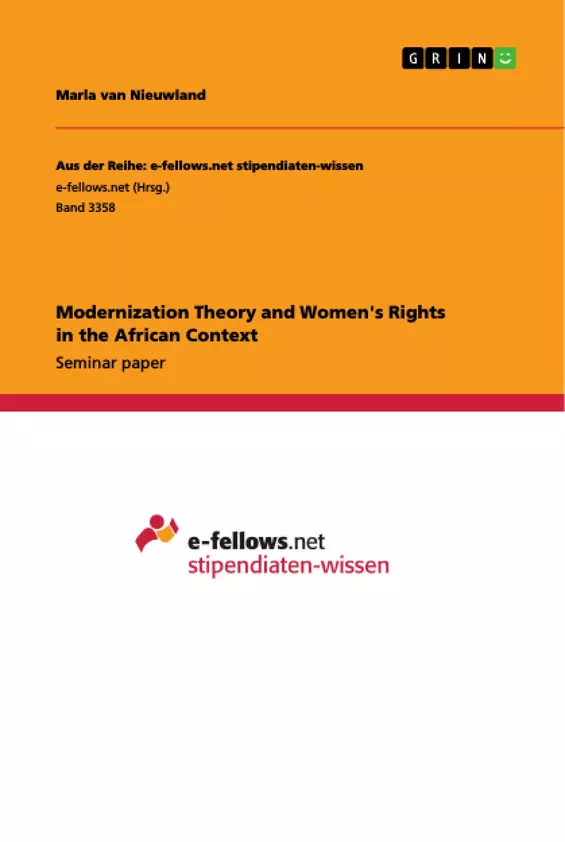Women currently hold on average less than ¼ of parliamentary seats worldwide. The range of female representation in national parliaments is staggering: countries are still in existence with zero female legislators, for instance Yemen, Papua New Guinea and Vanuatu, while on the other hand Rwanda with 61.3% of seats being held by women leads the way on female leadership. Scholars have estimated that, at current pace, it would take until the 22nd century for women to achieve political parity. Against this background of sustaining gender inequalities and seeing the extreme differences between countries, much research has been done on the topics of women’s rights and women’s leadership, in order to evaluate which approaches are most effective in creating actual gender equality.
This paper will analyze one of these approaches towards women’s leadership, namely the link between modernization theory and women’s representation proposed by Pippa Norris and Ronald Inglehart. In their theory, Norris and Inglehart observe that women’s representation in post-industrial societies is much better than in post-communist or developing societies and they trace back this difference to the modernization process and the influence of cultural attitudes towards women’s empowerment. While Norris and Inglehart articulated their theory back in 2004, much has changed since then. Especially in sub-Saharan Africa women have joined national legislatures in remarkable numbers over the past two decades, raising the question, if the modernization process has actually lowered cultural barriers towards women’s empowerment, or if other factors were at work.
To answer this research question, two African countries with very divergent cultural attitudes towards women’s rights, namely Tunisia and Botswana, are examined in the context of Norris’ and Inglehart’s theory in order to test, whether the hypotheses by Norris and Inglehart still hold up nowadays in the African context. This test will show, 1) if the theory is applicable to African countries at all and 2) if changes over the last two decades can be captured and explained by it.
Inhaltsverzeichnis (Table of Contents)
- Introduction
- Definitions
- Literature Review
- Theory
- Case Study Comparison
- Tunisia
- Botswana
- Discussion
- Conclusion
Zielsetzung und Themenschwerpunkte (Objectives and Key Themes)
This paper aims to analyze the link between modernization theory and women's representation, as proposed by Pippa Norris and Ronald Inglehart. It explores the theory's applicability to African countries and examines if it accurately captures changes in cultural attitudes towards women's empowerment over the past two decades. To achieve this, the paper compares two African countries with contrasting cultural attitudes toward women's rights: Tunisia and Botswana.
- Modernization theory and its impact on women's representation
- Cultural attitudes towards women's empowerment in the African context
- Case studies of Tunisia and Botswana
- Testing the validity of Norris and Inglehart's theory in contemporary Africa
- Exploring the influence of cultural factors on women's leadership
Zusammenfassung der Kapitel (Chapter Summaries)
The introduction presents the global context of gender inequality in political representation and introduces the research question of whether modernization theory accurately reflects the evolving situation of women's empowerment in Africa.
Chapter 2 defines key terms used in the study, including modernization theory, "developing", "post-communist", and "post-industrial" societies, and women's leadership and empowerment. It explores the critiques surrounding terms like "modernization" and "developing countries" and provides an overview of their nuanced meanings.
Chapter 3 reviews existing literature related to gender equality policies and the role of culture in women's empowerment, focusing on previous work by Ronald Inglehart and Pippa Norris on the "sexual clash of civilizations."
Frequently Asked Questions
How does modernization theory explain women's political representation?
Norris and Inglehart propose that modernization changes cultural attitudes, making societies more open to female leadership as they move from industrial to post-industrial stages.
Which African countries are compared in this study?
The paper examines Tunisia and Botswana due to their divergent cultural attitudes and political contexts regarding women's rights.
What is the "sexual clash of civilizations" concept?
It refers to the idea that the true divide between the West and other societies is not democracy itself, but attitudes toward gender equality and sexual liberalization.
Why is Rwanda mentioned as a leading example?
Rwanda leads the world in female political leadership, with over 61% of parliamentary seats held by women, challenging traditional modernization timelines.
Does modernization theory still hold up in Africa today?
The study tests if cultural barriers have actually lowered due to modernization or if other factors are responsible for the surge of women in African legislatures.
- Quote paper
- Marla van Nieuwland (Author), 2019, Modernization Theory and Women's Rights in the African Context, Munich, GRIN Verlag, https://www.grin.com/document/534853



